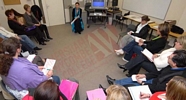Young, wild, and free ... isn't that what it's supposed to feel like to be a teenager? While it's normal for teens to push and discover their limits, it's also dangerous. Due in large part to the fact that parenting decisions are only as sound as the information on which they're based, more parents are choosing to rely on tools and technology than gut instinct.
Here are three strategies for parents concerned about their children's safety:
1.Install a GPS system in your teen's car.
In the old days, parents would check their cars for new scratches, dents, or overly fast tire wear and ask other parents if they had seen their kids driving recklessly or beyond their geographic limits.
Parents who utilize GPS technology know where their car is, where it has been, and how fast it has been driven. When continued driving privileges are tied to responsible use, safer driving results. More importantly, teens know that their parents have access to this information, which makes them feel safer if they get lost or into trouble. It's like having a parent in the car at all times.
2.Install software for monitoring email and chat room conversations.
Sexual predators target teens in Internet chat rooms. Parents should obviously urge their kids not to give out personal information or agree to meet someone they "met" on the Internet. However, since teens know their online activities are a privilege and can be monitored, they've got a constant reminder. Parents urge teens to resist talking or behaving online any differently than they would if their parents were in the room because, in a way, they are.
3.Initiate a parent - child contract and home drug testing program.
Peer pressure often increases when kids "just say no" to drugs, alcohol, or tobacco. Kids need a "socially acceptable" excuse, and the words "My parents test me" stop pushy peers in their tracks. Parent and Child Contract Software (PACCS), developed by Dr. Michael Reznicek, helps facilitate conversations and establish expectations (including both rewards and consequences) between parents and teens regarding drug use. Home drug testing kits can be administered at home and provide instant results for a fraction of the cost of a lab, without sacrificing accuracy or privacy.



